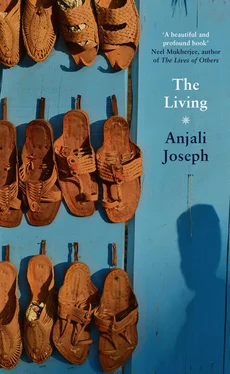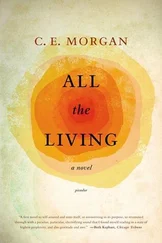I looked at him, the earnest eyes, which were unchanged, in the face, which was creasing like brown paper. I nodded.
The air smelled of flowers, and petrol. The back of the mechanic’s shop gave on to a ditch, then a field. I miss the country, I said. I don’t even think about it. And then when I’m here …
I took a sip of the santra. It was the same, more like solvent perhaps than I’d remembered, and as aggressively orangey. I passed the bottle to Suresh and immediately felt possessive, as though he might not give me my fair share. Relax, I told myself. You’re just drinking to keep him company.
He lifted the bottle. Good to see you.
It’s good to see you too, I said. I looked at the lights on our left, an occasional car passing, and heard the big road, out of sight, the sounds of a night-time field, crickets and other insects, the trilling of a small bird, the grass breathing. The air was soft and cool on my skin. Suresh gave a big sigh and a small burp.
Eh, I said. This sighing. I’ve started with that too. What is it?
He shook his head. I don’t know, he said, and chuckled.
What have we become, I said. The bottle was in my hand now. I took a much less cautious draught, coughed, and laughed. I wiped my face and handed back the bottle. I didn’t think we’d be like this, I said. I thought we’d be more, something.
He laughed. More what?
I don’t know. We had all those games. Explorers. Do you remember?
I remember, he said. I looked at his small, slightly plump hands, with their tapering fingers, and felt endeared to him in the old, possessive, dismissive way. I wanted to push him for no reason, but also put my arm around him and protect him from the world.
The bottle returned. I drank. I thought, I said, that we’d go into the world when we were older, do things.
Suresh looked ahead, thought. Why did we have to go out? It’s all one world. We were right there in it.
But it didn’t feel like that. We were protected, shut away.
We were children, he said. He accepted the return of the bottle. It was now half full. I looked at it a little sadly. I was nicely warm inside.
There’s another bottle, he said.
Oh no, I said. I won’t drink so much. This is just catching up.
Yes, catching up.
So what’s happening with you? I said.
He looked at the palm of his left hand. I don’t know, he said. Health’s not so good. My son’s doing well, though, and my daughter got married two years ago.
But you weren’t here for a while?
My son moved away. But then they wanted to come back. They’ve rebuilt the house, they already have three children.
Mm, I said. And you’re working? Or no need?
There’s no need, Suresh said. Anyway, I doubt I could now. Look at this. He held out his hand, which seemed to be doing a shaky dance all on its own.
What happened? I said.
He smiled a ruined, rueful little smile. After my wife died, he said, I started drinking more often.
You missed her?
We didn’t get along, he said. So you’d think — but somehow it was depressing. I’d become used to resisting her, or trying to stay happy despite her, something like that. When she was gone …
A car horn somewhere.
I drained the santra. The other bottle, I reminded him.
Yes. He passed it to me and this time it was I who cracked the seal, a happy, decisive little sound.
When she was born, I said. Sorry. Gone. When she was gone.
I felt excited, and highly lucid. We were about to get to the nub of the matter. I would solve his problem, and then move on to mine, and we would work it out together. Disciplined thought was what had been lacking but now the moment had arisen.
I don’t know, Arun, he said, disappointing me. Things got away from me for a while.
After her death?
He nodded. I felt old. There was no need to work any more. I did for a while. You know how it is. You’ve spent so long learning a skill.
Yes, I said eagerly. Recently because I’ve been unwell I haven’t been able to work and I feel hollow. I thought I hated it but I discovered that without it I’m lost. I –
He ignored me. But a hand tapped my shoulder.
Eh?
The bottle.
I passed it over.
I still think about those days, you know, I said. For example, the well, the one we used to go to.
What well? said a voice in the darkness.
The well, you must remember, I said. You know, the one near the Narsoba mandir.
Mandir? We never went to Narsobawadi.
Not Narsobawadi. The field temple. You know where I mean.
Well?
Yes, I said. The well.
About a minute later, something very tedious was happening.
Baba, a voice was saying, not exactly patiently but clearly and repeatedly. Baba. We need to go. Wake up, get up.
What? I said. Deepak and a young man I didn’t immediately know were there.
Can you look after him? Deepak said. Suresh was standing, but nearly falling down, his face foolish and friendly. He always makes an ass of himself, I thought. I stood, and collapsed like a broken chair.
Here, Deepak said. Put your arm here. Okay. Are you ready? We need to go back now.
Just catching up, I said. Old friends. Childhood.
We didn’t know where you were, he said. We’ve been looking for you for an hour.
*
It’s on this road?
It’s just up this way, I said. It’s not far. But I was wheezing. Oh, I groaned.
You’re sure you want to go? Deepak said.
Yes yes, I said. I just want to take a look at the place. You don’t have to come, I said. I very much wanted him to come.
To my relief he ignored what I’d said. That’s the nice thing about Deepak. He understands how you feel. And yet again, he’d been there when I’d had a shameful moment.
We carried on walking, he slowly in sympathy with his ancient father, and I with effort, but also pleasure. It wasn’t yet warm. I had clean clothes on and I’d bathed. Strangely, I’d woken feeling good, and lighter, if a little acid. I supposed we had napped there for some time, Suresh and I. Suresh had been taken home last night, and I didn’t remember much else of what had happened.
The rest of the party went off fine? I said.
Deepak gave me a look. Mm, yes, he said.
And now, see the sign? I said. Someone had put up a hand-painted placard: Narsoba mandir.
This is the lane?
This is it.
We turned and walked between waving fields of green wheat. At the end of the lane, a small temple under a tree. This is it? Deepak said.
No no, I said. I don’t know what this is. All this, I waved my hand at the small cement structure under the banyan, this is new. Further. Here. I waved my right arm like a signalman and set off ahead, invigorated.
The country opened out, and my mind too expanded, loosened.
See how the sky is here, I said. It was like this even when I was a boy. Deepak was following me and I led till we got to the cucumber field. Still the same smell, green and wet. They still grow cucumbers here, I said. The house in front had been rebuilt, a little bigger and whiter. We walked across the field and a man stopped us.
Are you looking for something?
We’re going to the Narsoba mandir, I told him. He stood aside and waved behind him. There it was, a small pukka structure now, painted cream and red with a lion in plaster atop the roof, and an orange flag.
When was all this built? I asked.
He spoke a different Marathi, perhaps inflected with Kannada. Ten years ago, he said.
I used to come here as a child, I said, and he nodded, face blank. The local community leaders collected the money and made it pukka, he said. You can see the names outside.
Don’t you want to go in? Deepak asked me.
I’ll just take a look, I said. But I felt strange. This new, white structure. We crossed the field of cucumbers, and I removed my shoes and went up the small steps. There was a clean white parapet all around the shrine. But inside it looked familiar. I reached up my hand almost without thinking, and rang the bell. Within, the same stone faces: one in the centre, dark, with a beard etched on. And the two women on either side. I saluted him. Perhaps I even prayed.
Читать дальше
Конец ознакомительного отрывка
Купить книгу











